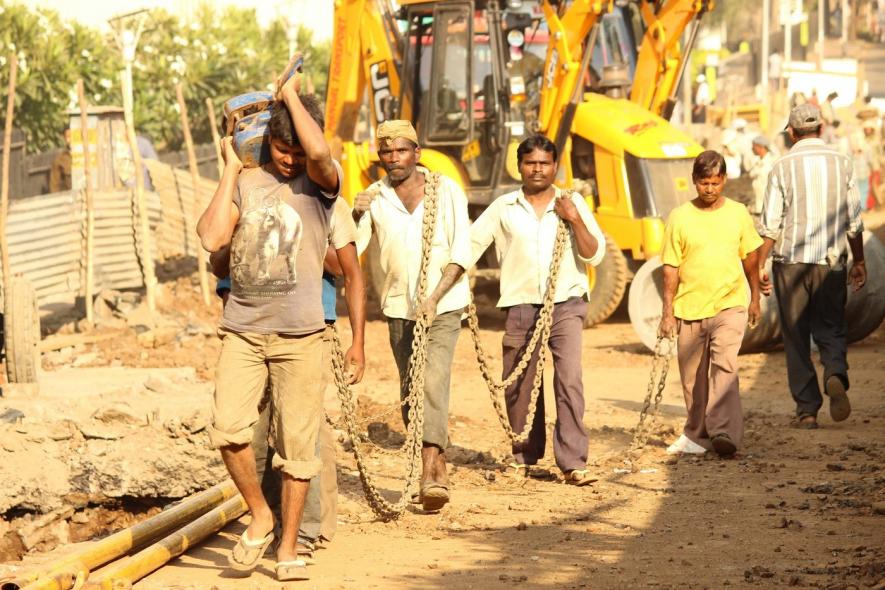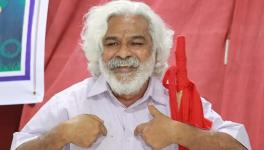Telangana Polls: Under TRS Regime, Workers Remain a Forgotten Force

Image for representational use only. Image Courtesy: PARI
Under Telangana Rashtra Samithi rule headed by K Chandrashekar Rao, the issues of workers and employees, both in the organised and unorganised sectors, have been undermined, causing worsened living conditions for millions of people in Telangana. Trade union activists and political analysts say that not only trade union rights but the democratic rights of workers in almost all sectors are also facing severe attack.
Despite its repeated promises such as on formalisation of contractual workers and increase in minimum wages, the TRS has left workers unprotected and unsecured, with lakhs of them struggling to survive with meagre wages, says V Ratnakar Rao, Telangana General Secretary, All India Trade Union Congress (AITUC). Rao told Newsclick that “The TRS government has followed in the footsteps of the BJP-led central government in fostering anti-working class policies. When the Modi government proposed a merger of 44 labour laws into four Labour Codes, with only motive to further the interests of industrialists while undermining the workers, the Telangana government welcomed the proposed move.” He added that the TRS government did not even revise the minimum wage Acts to any of the scheduled employments in the state.
In Telangana, there are 72 official scheduled employments in various categories of industries -- pharma, cotton, tobacco, electronics, ferrous, gunnies and so on.
R Sudha Bhaskar, Vice President, Telangana state Centre of Indian Trade Unions (CITU) told Newsclick that workers from 71 scheduled employments have been demanding that successive governments formulate suitable Government Orders (GO) for over a decade now and the TRS government is no different from the earlier regimes in the region.
As per trade unions estimations, there are about 90 lakh persons (one fourth of the state population) involved in unorganised sector, including ghamali workers (loading and unloading workers), transport sector (auto, lorry and taxi drivers), construction sector, beedi workers and agricultural workers. In the organised sector, there are eight lakh workers, including public sector, RTC employees and IT employees.
Also Read: Telangana Polls: Paid Rs 173/Day, Beedi Workers Feel Betrayed by Successive Governments
Industries (pharma, electronics, SEZs) in the state are mainly concentrated in and around Hyderabad and surrounding districts - Medchal, Sangareddy, Medak and Nalgonda. The belt of Khammam, Adilabad and Karimnagar have public sector units, including NTPC plants. Numerous sugar factories and cement factories are located in Nizamabad and Nalgonda districts respectively.
Minimum Wage Issue Stuck With CMO
In 2014, the TRS government constituted a Minimum Wages Advisory Board and appointed on Nayini Narasimha Reddy, state cabinet minister for home, labour and employment, as its head. One of the board’s recommendations is to increase the minimum wage of Rs 12,000 in five scheduled employments.
“Trade unions have approached Nayini Narasimha Reddy demanding the implementation of the proposed recommendations, but every time, the Minister would say that that matter is stuck with the CMO (Chief Minister Office),” Sudha Bhaskar said. Reddy is also a state honorary president of a major trade union, Hind Mazdoor Sabha.
As per the labour department’s recent notification, the minimum wage of an unskilled worker in any establishment is just Rs 8,777 per month.
Speaking to Newsclick, Ajay Gudavarthy, Associate Professor, Centre for Political Studies, Jawaharlal Nehru University, Delhi, said: “It is an irony that the formation of Telangana after an unprecedented mobilisation of various economically-deprived social groups has completely failed to foreground the issue of workers and employees. The State Home Minister himself was a former trade union leader but no longer associates himself with the question of minimum wages or formalisation of contractual workers. Instead, Telangana is at the forefront of the race for ‘ease of doing business’ citing the danger of capital flight and impact on urban growth.”
Industrial Employment Declines
As a new state, Telangana witnessed the closure of major and minor industries. “In the last four years, major industries - Sirpur Paper Mill in Adilabad, AP Rayons factory in Wardannapet, Mulugu, Nizam Sugars factory in Bodan, Suryavamsi Spinning mills in Bhongir were closed abruptly, leaving the workers in dire straits. “This suddenly left more than 10,000 persons without jobs. None of these factories obtained the mandated permission from the state government,” said Sudha Bhaskar.
Section 5(B) of Industrial Disputes Act 1947, which deals with the closure of any industries that employs more than 100 workmen, mandates industries to take permission from the state government before going in for closures.
As per reports, nearly 1,500 small-scale factories have been closed since 2014 in the state.
Also Read: Telangana Polls: TRS Set to Face Ire of Unemployed Youth
Lakhs of Unfilled Vacancies in Govt. Sector
Even in the government sector, instead of going for regular recruitment, the TRS government chose to hire employees on a contract basis or work itself was outsourced.
On June 2, 2014, the day when Telangana was officially formed, KCR announced that there were 1.07 lakh vacancies in the government sector. “However, in his tenure, only some 15 thousand persons got government jobs,” Ratnakar Rao says.
The TRS government has always preferred contract and outsourcing jobs to regular recruitment. “KCR has redrawn the map of Telangana by transforming 10 districts into 31 districts, but no new job has been created in any of the departments. While there are 400 model schools, none of the employees is recruited on a regular basis by this regime,” says Ratnakar Rao, adding that almost all the computer operators in government departments work through outsourcing.
Forgotten Migrant Workers
Lakhs of workers migrate to Telangana from states such as Bihar, Chhattisgarh, Jharkhand, Odisha and several other states in sectors such as brick-making, construction, health and so on. Despite laws on protection of their rights, the TRS has neglected these sections. “Company owners prefer migrant workers as most of them are not unionised and do not demand their rights. The government, which should ensure their safety, has outrightly forgotten them, perhaps because they do not cast their votes here,” says Ratnakar Rao.
Elaborating on the plight of migrant workers, Gudavarthy says, “Today Telangana has workers from Jharkhand working in less-than-humane conditions. It is a tragedy that the state is contractualising local workers and employing migrants for further exploitation.
In the absence of any other narrative other than that of converting regional spaces as hubs of global investment, “regional parties like the TRS hardly reflect the interests of the workers and continue to represent the interests of global capital. The corporate model of jobless growth has resulted in no new or significant employment opportunities leading to unrest among students and youth who are, in fact, the prime opposition to the TRS today in Telangana,” he adds.
There is a popular saying in the Telugu language: ‘Telangana Udyamala Gadda’, translated as ‘Telangana is a land of movements’. In fact, the formation of Telangana state is a result of people’s movements and large sections of industrial workers participated in the movement, certainly hoping to claim their rights in the new state. But, in the last four years, workers in the state, like elsewhere in the country, have led numerous struggles for basic rights, such as the proper implementation of labour laws, social security and better future for their families.
In simple words, workers are still struggling for equal pay for equal work, especially women worker’s struggle for maternity leave, is evident in every corner of Telangana.
Also Read: The Gloomy Picture of Telangana’s Finances
Get the latest reports & analysis with people's perspective on Protests, movements & deep analytical videos, discussions of the current affairs in your Telegram app. Subscribe to NewsClick's Telegram channel & get Real-Time updates on stories, as they get published on our website.
























